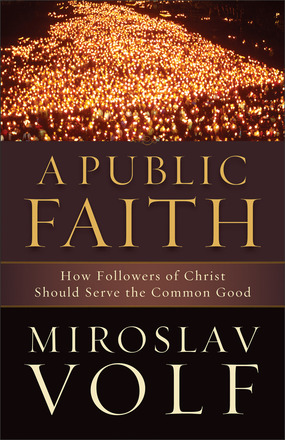
Miroslav Volf (Henry B. Wright Professor of Systematic Theology / Founding Director, Yale Center for Faith & Culture)* believes it is possible to be unapologetically Christian, or otherwise religious, in a pluralistic world without resorting to violence or, alternatively, isolating yourself into a cultural ghetto. In A Public Faith: How Followers of Christ Should Serve the Common Good (Baker, 2011), he argues that Christians can choose a third way of seeking the public good while remaining faithful to the core values of their faith — the dignity of humans in the image of God, the servant way of Christ, the care of creation. Along the way, Volf also discusses why believing people have often chosen the extremes rather than this third way.
What I particularly appreciate is that he does not believe that Christians need to mute their message to do so. Rather, Volf frames this as the sharing of wisdom and proposes that this may be done without imposing on others when we speak as witnesses and not tyrants, when we give freely rather than “selling”, as we embody rather than abstractly teach, and as we point to Christ and not some wisdom within either ourselves or the other.
Volf concludes with four propositions that he believe support religious pluralism in the public square:
1. Treating all as equals because all are related to the one God (not sure how this works for polytheists or atheists)
2. Practicing a Golden Rule ethic of love for neighbor.
3. Claiming no right for ourselves we do not grant to others.
4. Renouncing all coercion of religion.
While all of these are propositions that seem to flow from Christian belief, the question remains of whether Christians will embrace these and others agree as well. Personally, I believe we should as Christians, whether this results in being taken advantage of or not. And in a relatively short book, I think he has laid out a basic framework that could shape a constructive engagement of Christians in public life.
* Additional publications by Miroslav Volf include Allah: A Christian Response (Harper Collins, 2012), Free of Charge: Giving and Forgiving in a Culture Stripped of Grace (Zondervan, 2006), Exclusion and Embrace: A Theological Exploration of Identity, Otherness, and Reconciliation (Abingdon,1996), and After Our Likeness: The Church as the Image of the Trinity (William B. Eerdmans, 1997).
From the desk of the editor . . .
Video of Miroslav Volf engaging A Public Faith is available on Baker Press’ page, below is a teaser 🙂
Also, if you have not already done such, I encourage you to read Bob Trube‘s review of Miroslav Volf‘s Exclusion & Embrace: A Theological Exploration of Identity, Otherness, and Reconciliation (Abingdon, 1996): Book Review: Exclusion & Embrace (9/17/2013).
————–
Note to the reader: The Emerging Scholars Network (ESN) continues to encourage those who have read the book “under review” to comment. In addition, we acknowledge that some who have not read the book “under review,” also bring helpful insights to the concepts/data explored in a given book, the writing of a particular author, and/or the understanding of the concepts/data as offered by the reviewer. As such we are open to “civil” on-topic comments from both those who have read and those who have not read the book “under review.”
Deep down ESN longs for reviews such as those offered by Bob not only to foster dialogue, but also to serve as teasers — providing an opportunity for our readers to discern what books to place in their personal and book discussion group queue. If you have books you desire to review and/or to have reviewed by ESN, please email ESN.
Bob Trube is Associate Director of Faculty Ministry and Director of the Emerging Scholars Network. He blogs on books regularly at bobonbooks.com. He resides in Columbus, Ohio, with Marilyn and enjoys reading, gardening, choral singing, and plein air painting.

Leave a Reply